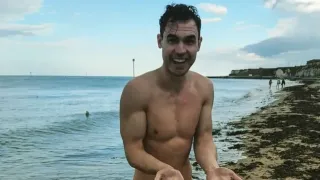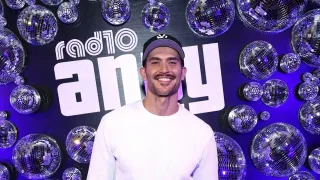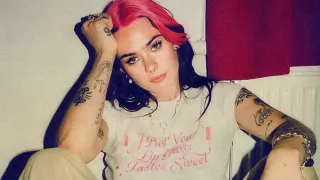
3 hours ago
Tom Daley on Being Out, Not Owed: Why Queer Visibility Isn’t a Political Contract
READ TIME: 14 MIN.
There’s a certain mythology around coming out—especially for those who do it in the blinding glare of Olympic stadiums and global media. For Tom Daley, the journey from teenage diving prodigy to proud gay dad and knitter extraordinaire is well documented, but there’s a twist in his story that feels especially relevant for today’s LGBTQ+ generation: the insistence that visibility is not a political contract, and that being out should never mean being owned by anyone’s cause but your own .
“I think what needs to happen is that if people choose to come out, there shouldn’t be this big expectation that they’re going to politicise everything they do. They should just be supported for being them. Their visibility and existence is enough of activism and advocacy without warranting extra commentary about what they should or shouldn’t be doing.”
This is Daley’s rallying cry—a gentle but pointed nudge to the queer world and its many allies (and sometimes its critics): coming out is a milestone, not a lifelong job description.
For many LGBTQ+ people, the coming out moment is both personal and, inescapably, political. But Daley wants us to remember that the act itself is enough. “Come out when you’re ready. It’s not one simple rule for everyone. Everybody has to weigh up their own position rather than coming out because they feel they should. People who say, ‘You have to come out,’ don’t understand that,” he told Attitude . For Daley, queer visibility is potent by its very nature—no need for a megaphone unless you want one.
This perspective is especially timely. As more athletes, artists, and public figures come out, the chorus of expectations grows louder: become an activist, take a stand, represent us all. But Daley is clear: “Lots of people don’t want that responsibility. They just want to be themselves.”
Daley’s visibility has always come with a side of vulnerability. In his recent interview, he opened up about the rarely-discussed pressures of body image and disordered eating in elite sports. “As a sports person, you are seen as somebody that doesn’t have any issues with their body and they’re, like, totally fine and you’re off to the races, if you like... But actually, that’s what creates a magnifying glass to the little discrepancies with your body and how it’s always seen as something that is either good at performing or it’s not good at performing. And how it looks. And you’re constantly being judged,” Daley explained .
His candor is a breath of fresh air in a sporting culture that still too often equates masculinity with emotional silence. Daley’s willingness to discuss bulimia, body dysmorphia, and the shifting relationship with his body post-retirement is a reminder that queer athletes don’t just break records—they break taboos .
“It was a very formative period for me. And I just… I really struggled with it. And it’s something that I then struggled with for years after that,” he said, reflecting on the pressure cooker of his late teens and early twenties .
Since coming out, Daley has become an informal mentor for closeted queer athletes around the world—many of whom reach out to him from countries where it’s still illegal to be gay or where the sports world remains stubbornly conservative . He serves as a “sounding board” for those navigating hostile environments, offering support without pressure. “Don’t struggle through it alone. Even if you can find a person that you really really trust,” he urges. The message: find your own path, and don’t let anyone define how visible you need to be .
He knows firsthand what it’s like to feel exposed and alone, recalling the “really lonely experience growing up and having to keep everything so secret about who I was” . Now, Daley’s advocacy is rooted not in grandstanding, but in solidarity and empathy—a reminder that queer resilience is both revolutionary and mundane.
Daley is hopeful about the future, noting that more athletes are coming out and finding acceptance. “I think now, more and more athletes are feeling comfortable about being themselves and being able to come out. But, at the same time, there are still so many sports where it isn’t as accepting, especially in team sports and in sports predominantly watched by straight men,” he observes .
But visibility, he says, doesn’t come with a how-to guide—or a universal obligation. “Their visibility and existence is enough of activism and advocacy,” Daley insists. That’s a powerful message for any LGBTQ+ person who feels the weight of representation: you are enough, just as you are .
Beyond the pool, Daley’s life as a father, creator, and proud member of a rainbow family has become a beacon for others . Whether he’s hosting knitting competitions or starring in the new documentary *1.6 Seconds*, Daley has found new ways to express himself and to connect with the community . His message is simple but radical in its ordinariness: “Being gay isn’t something that’s gonna stop you from being able to achieve your dreams” .
As queer people, we are sometimes asked to explain ourselves, to represent, to justify—when, in reality, our mere existence in spaces that were once forbidden is itself a quiet revolution. Daley’s story is proof that you don’t have to carry every flag to make a difference. Sometimes, just being out, honest, and fully yourself is the most radical act of all.
Tom Daley’s journey reminds us that coming out is an act of courage—but it isn’t a vow of eternal advocacy. Whether you’re doing it on a YouTube video, a gold medal podium, or in the quiet of your own bedroom, the only thing you owe anyone is your truth. The rest—if you choose it—is just extra.
So, for every queer person feeling the pressure to be loud, political, or perfect: remember Tom Daley’s words. You’re enough. You’re seen. And your story matters—on your own terms.






